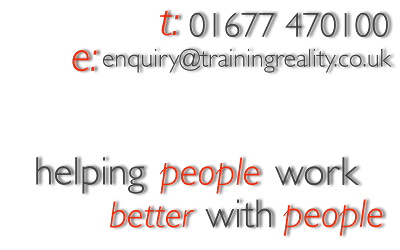Please press (at least!) one of these.
It costs you nothing, and (possibly) helps us spread the word!
...versus behavioural singularity...
Tuesday, 9 March 2010
My last article dealt with the potential issues created by corporate conformity. Particular areas for concern that were raised included:
- group think
- inauthenticity
- sub-optimal performance
- rigidity
Moving to the other end of the spectrum then, we have studied non-conformity, or what I’m going to define as behavioural singularity. I want to make this distinction because I want ensure that the "teenage" approach to being individual doesn’t cloud the discussion – the concept that many teenagers try incredibly hard to be "different" whilst ensuring that actually, all they are really doing, is conforming to a different norm. This article is about being really different.
To explain what I mean by behavioural singularity in this context, recall those people who are deliberately different. The people who make an effort to stand out from the crowd. The people who choose to take the opposing view to the majority simply because it is the opposing view. I think there are pros and cons in having these people around in teams and organisations:
They are unique
The biggest single advantage that the behaviourally singular people have over their conformist counterparts is that they are, by definition, unique. If one conformist leaves a team, company, or organisation, then (arguably) very little has been lost – there are a million and one other people expressing the same views and using the same approaches who can take their place.
However, losing the only complete and deliberate non-conformist makes the chances of the problems associated with conformity developing much, much higher.
Norm-challenging
In addition to being (slightly) valuable simply because they are unique, there is a more fundamental value to be appreciated. Teams need people who will challenge the norms; who will ask the tough questions; who will poke, prod and nag away at things and not take no for an answer.
Having someone take the opposite view to you and challenge you is the first step on the road to truth-seeking Socratic Dialogue, and you need to have people in organisations who are willing to be unpopular enough to challenge the norm.
Inauthenticity
Problem number one comes about if this behaviourally singular approach is inauthentic. As with all inauthentic behaviour, negative outcomes are just around the corner:
- The individual themselves may not be able to sustain it. They may tire of acting the role, particularly if they are not rewarded for it, and may then fail to provide the positive aspects of their role.
- Colleagues, managers and leaders in the organisation may begin to see through this act, and therefore take the potentially useful challenges less seriously.
- As the behaviourally singular approach is non-authentic, the value of the challenges that the individual makes are likely to be lower to the rest of the team or organisation than a genuinely-held, authentic challenge.
Undermining and wearing
Longer term, there is a real danger, particularly if inauthenticity is exposed, of the balance of the organisation simply becoming bored, worn down and irritated by the person who takes the opposing view for the sake of it.
Organisations, teams, companies and indeed any group can ultimately be undermined by difficult individuals if they are not themselves strong enough to resist.
Rigidity
As with conformity, there is a potential for rigidity here, simply from the opposite side. The issue that causes the rigidity is the same for both conformity and behavioural singularity – it is driven by the fact that the people involved are choosing their positions with reference to their relative position to everyone else, not because of data, knowledge, skill or other positive external factors.
--
So, if complete conformity and behavioural singularity have their problems, where is the sweet spot? The next article will be published soon…
Please press (at least!) one of these.
It costs you nothing, and (possibly) helps us spread the word!



